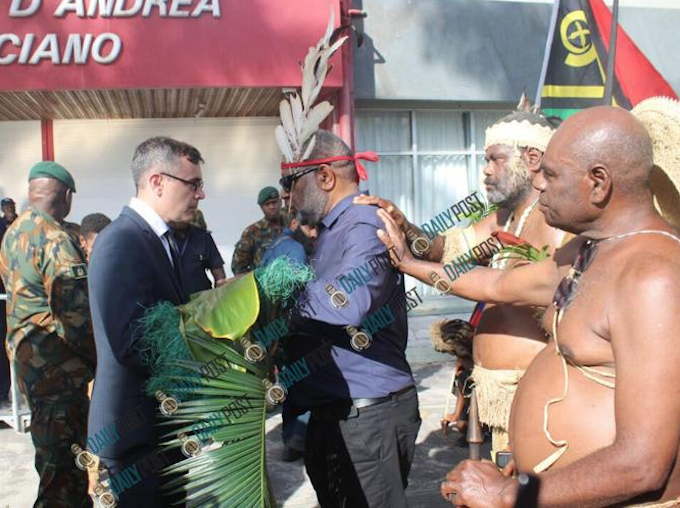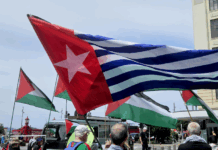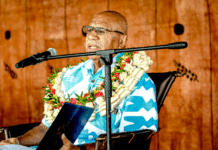
By Nicholas Mwai in Port Vila
French Ambassador Jean-Baptiste Jeangène Vilmer to Vanuatu has hit back at criticism about French policy over Kanaky New Caledonia with an op-ed article published in the Vanuatu Daily Post.
His article addresses key concerns regarding New Caledonia’s indigenous recognition, the decolonisation process, discrimination, military operations, and calls for independence in response to a protest petition delivered by the president of the Malvatumauri Council of Chiefs (MCC), Chief Paul Robert Ravun, earlier this month.
At least nine people, including two gendarmes, have died in the unrest and rioting that followed protests against French constitutional changes starting on May 13 that critics say will further marginalise the indigenous people of the territory.
- READ MORE: Fresh violence flares up in New Caledonia – 38 arrested
- Other reports on the Kanaky New Caledonia crisis
Damage from the rioting and arson is estimated to be 1 billion euros (about NZ$1.8 billion).
Eight arrested pro-independence leaders and charged over the riots were transferred to prisons in mainland France last weekend to await trial in a move heavily criticised across the Pacific.
Key points made by Ambassador Vilmer in his article in the Vanuatu Daily Post today were:
Recognition of indigenous people
Ambassador Vilmer reaffirmed France’s commitment to recognising the Kanak people as indigenous, emphasising their unique identity and cultural heritage, “the French government formally acknowledges the Kanaky people as indigenous, recognising their unique identity and cultural heritage”.
Highlighting the 1998 Nouméa Accord, Vilmer noted its acknowledgment of the dual legitimacy of both the Kanak people and other communities that have contributed to New Caledonia’s development, initiatives such as the inclusion of Kanak languages in the education system and the establishment of the Tjibaou Cultural Centre that underscores French support for promoting and defending Kanak culture.
Denouncing discrimination
Vilmer stressed France’s rejection of discrimination, saying “the French government denounces all forms of discrimination and is committed to promoting peace, justice, democracy, and respect for human rights”.
Measures aimed at improving access to employment, education, and public services for the Kanak population had been implemented, although Vilmer acknowledged that challenges remained and more work was needed to reduce inequalities and foster harmonious relations among all communities in New Caledonia.
Decolonisation of Kanaky
Regarding the decolonisation process, Vilmer highlighted France’s support for New Caledonia’s path towards self-determination, which began in 1988, “the process of decolonisation in New Caledonia has been ongoing since 1988, with the French government supporting a path towards self-determination”.
The Nouméa Accord of 1998, providing for substantial autonomy and the gradual transfer of powers to local authorities, had been praised by the United Nations Decolonisation Committee, despite three referendums in which a majority chose to remain part of France.
Vilmer underscored France’s commitment to ongoing dialogue and cooperation with regional partners to build a shared future.
Immediate cessation of military operations
Vilmer addressed concerns about military operations, clarifying that none were currently underway in New Caledonia, “there are no military operations currently taking place in New Caledonia”.
Law enforcement activities were being conducted by police and the gendarmerie to maintain public order and protect residents and infrastructure, adhering to the principle of proportionate use of force. The French government remained committed to ensuring safety and security while addressing unrest through dialogue and peaceful means.
Independent international investigations
On the issue of independent international investigations, Vilmer said there was “no necessity” for such measures as law enforcement actions were being supervised by independent courts following due legal process, “there is no need for independent international investigations”.
Reinforcements deployed by the French state were deemed necessary to prevent further violence and socioeconomic damage. Vilmer emphasised the government’s “transparency and openness” to dialogue concerning law enforcement operations.
Support for Kanaky independence
In response to calls for Kanak independence, Vilmer highlighted France’s engagement with regional partners and the structured process of self-determination provided by the Nouméa Accord, “the French government continues to engage with regional partners to support dialogue and cooperation”.
The Accord had facilitated multiple opportunities for the Kanak people and all New Caledonians to express their will.
Ambassador Vilmer reiterated France’s dedication to advancing an “inclusive and peaceful future” for New Caledonia through continued dialogue and partnership with regional partners.
Nicholas Mwai is a Vanuatu Daily Post reporter. This article is republished with permission.












































